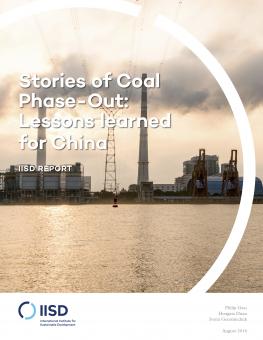
Stories of Coal Phase-Out: Lessons learned for China
This report offers a summary of several countries’ experiences implementing energy policy shifts in an area of particular interest to China: the transition away from coal to cleaner fuels and a low-carbon economy.
This report offers a summary of several countries’ experiences implementing energy policy shifts in an area of particular interest to China: the transition away from coal to cleaner fuels and a low-carbon economy.
Using IISD’s “window of opportunity” framework, these case studies are analyzed in terms of the four critical elements of success: context, champions, concerns and complementary policies. In the second part of the briefing note, we apply the same framework to China’s own experiences in phasing out coal around Beijing. The briefing note aims to assist policy-makers, the expert community, media and all others interested in the lessons learned that countries can exchange and benefit from international experience, including within the G20 and UNFCCC processes.
You might also be interested in
Heatwaves to hit China once every 5 years as global extreme weather events multiply, study finds
Record-breaking heatwaves that have scorched North America, Europe and China are set to worsen in future unless the world stops burning fossil fuels, according to a study by the World Weather Attribution (WWA) academic initiative.
Are Countries Walking the Talk on Cutting Carbon?
In the race against climate change, increasing ambition over time is key. But revised commitments from parties to the Paris Agreement lack two critical components of ambitious climate action.
Doubling Back and Doubling Down: G20 scorecard on fossil fuel funding
This study tracks, for the first time, each G20 country's progress on ending support for fossil fuels—ranking their transparency, commitments, and financial support to oil, gas, and coal.
Health Co-Benefits from NDC Implementation in China
This report summarizes the policy efforts that the country is undertaking to meet its NDC targets and the related expected health co-benefits, based on recent scientific literature. It compares public budget allocations to health, climate change-related measures and subsidies to fossil fuels.